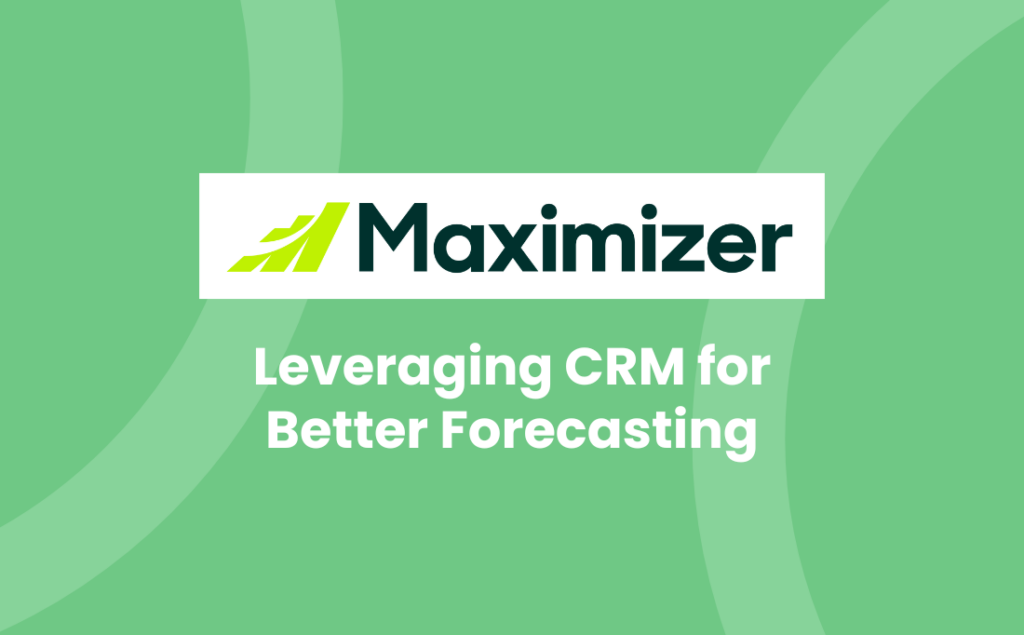In today’s rapid business world, accurate forecasting can make or break your success. Leveraging Customer Relationship Management (CRM) systems offers a powerful way to enhance your forecasting capabilities. By integrating CRM data, you gain valuable insights into customer behaviours, sales trends and market dynamics.
Imagine making decisions based on real-time data rather than guesswork. With CRM, you’re not just storing customer information; you’re holding a wealth of analytics that can predict future sales and identify growth opportunities. This article will explore how to effectively use CRM for better forecasting, helping you stay ahead in the competitive world.
Key Takeaways
- Enhanced Forecasting Accuracy: Leveraging CRM systems like Maximizer CRM can significantly improve forecasting accuracy by analysing historical data and identifying trends.
- Centralised Data Management: CRM systems centralise vast amounts of customer interaction data, reducing time wastage and improving the quality of insights derived.
- Real-Time Analysis: Integrating sales data for real-time analysis helps in making immediate adjustments to sales strategies, ensuring accurate demand prediction and inventory management.
- Advanced Analytics Tools: Features such as advanced customer analytics and behavioural insights help in understanding customer preferences and predicting future buying patterns, enhancing strategic decision-making.
- Effective Data Practices: Implementing effective data management practices, including integration, cleaning, and real-time updates, is crucial for maximising CRM’s forecasting capabilities.
- Comprehensive Training: Training teams in how best to use CRM usage ensures that all users can contribute to and benefit from the system’s features, leading to better operational efficiency.
Understanding CRM and its Impact on Business Forecasting
Leveraging CRM systems significantly enhances business forecasting. Maximizer CRM, a solution offered by Avrion, supports manufacturing businesses in their digital transformation journey.
The Role of CRM in Data Collection
CRM systems collect vast amounts of data from various customer interactions. This data includes purchase history, communication logs, and behavioural patterns. With Maximizer CRM, you can centralise this information for easy access and analysis. Centralising data enables manufacturers to understand customer needs better and streamline their sales processes.
By integrating different data sources into one platform, you reduce the chances of data redundancy and improve the quality of the insights derived. Accurate data collection is crucial for making informed business decisions.
How CRM Improves Prediction Accuracy
CRM systems like Maximizer improve prediction accuracy by analysing historical data trends. This analysis helps identify patterns that can predict future sales outcomes. For manufacturing companies, understanding these trends means better inventory management and optimised production schedules.
Maximizer’s advanced analytics features allow you to create detailed reports on sales performance and customer behaviour. These reports provide actionable insights, enabling you to forecast demand more accurately.
Integrating AI-driven tools within the CRM further boosts predictive capabilities. These tools analyse real-time data to adjust forecasts dynamically, helping you stay ahead in a competitive market.
Key Features of CRM That Enhance Forecasting
Leveraging Maximizer CRM, provided by Avrion, offers significant advantages for manufacturing businesses aiming to improve forecasting accuracy and operational efficiency.
Integrating Sales Data for Real-Time Analysis
Maximizer CRM integrates sales data from various touchpoints, providing real-time insights. By consolidating data from multiple sources, you can monitor sales performance accurately. This integration reduces redundancy and enhances data quality, enabling more precise forecasts. Real-time analysis helps identify trends and patterns, facilitating immediate adjustments to sales strategies.
Customer Analytics and Behavioural Insights
Maximizer CRM offers advanced customer analytics tools. These tools help you understand customer behaviour and preferences through detailed reports and visualisations, such as dashboards. By analysing historical purchase data, you can predict future buying patterns. This insight aids in inventory management and production planning, ensuring that your manufacturing process aligns with market demand. Leveraging these behavioural insights supports strategic decision-making and improves overall forecasting accuracy.
For more information on how Avrion’s digital transformation services with Maximizer CRM can enhance your forecasting capabilities, visit Avrion’s Solutions Page.
Strategies for Leveraging CRM for Improved Forecasting
Leveraging CRM systems like Maximizer CRM can significantly enhance your business forecasting capabilities. By adopting specific strategies, you can optimise the use of your CRM for more accurate and reliable forecasts.
Implementing Effective Data Management Practices
Effective data management practices are crucial when using a CRM system. Ensure that all customer interactions, sales data, and market insights are consistently recorded in Maximizer CRM. This centralisation helps to create a comprehensive view of your business operations.
- Data Integration: Integrate various data sources into Maximizer CRM to ensure a unified database. This includes linking ERP systems, marketing automation tools, and financial software.
- Data Cleaning: Regularly clean your data to remove duplicates and outdated information. Accurate data ensures better forecasting accuracy.
- Real-Time Updates: Maintain real-time updates within the CRM to reflect current market conditions promptly. Up-to-date information allows for timely adjustments in your forecasting models.
Training Teams for Maximum CRM Utilisation
Training your teams on how to effectively use Maximizer CRM is essential for leveraging its full potential. Proper training ensures that everyone can contribute to and benefit from the system’s capabilities.
- Comprehensive Training Programmes: Develop comprehensive training programmes that cover all aspects of Maximizer CRM usage. Include modules on data entry, report generation, and analytics.
- Regular Workshops: Conduct regular workshops to keep teams updated on new features and best practices. Continuous learning helps in adapting to changes swiftly.
- User Support: Provide ongoing user support through helpdesks or dedicated support teams. Immediate assistance helps resolve issues quickly, ensuring uninterrupted usage of the CRM system.
By implementing these strategies, you can maximise the benefits of Maximizer CRM in your manufacturing business’s digital transformation journey with Avrion’s expert services, leading to improved forecasting accuracy and strategic decision-making.
Case Studies: Successful CRM Implementation
Examining real-world examples highlights how CRM systems like Maximizer by Avrion can transform forecasting in the manufacturing industry.
Sectors Where CRM Forecasting Has Had Significant Impact
Several sectors have seen substantial benefits from CRM forecasting. In automotive manufacturing, companies use CRM data to predict demand trends, reduce excess inventory, and improve supply chain efficiency. Electronics manufacturers leverage CRM insights to forecast product lifecycles accurately, ensuring timely updates and avoiding obsolescence. Consumer goods producers employ CRMs to understand seasonal demand fluctuations, optimising production schedules accordingly.
Conclusion
Leveraging CRM systems like Maximizer CRM by Avrion can transform your approach to forecasting. By centralising data and integrating various sources, you gain deeper insights into customer behaviour and market dynamics. This enhanced visibility supports data-driven decision-making and identifies growth opportunities. Advanced analytics and AI-driven tools within CRM further refine your predictions, optimising inventory management and production schedules.
Successful implementations in diverse manufacturing sectors illustrate the tangible benefits of CRM forecasting. From reducing lead times to boosting profitability, the impact is clear. Embrace CRM for better forecasting and unlock the full potential of your business operations.
Frequently Asked Questions
What is the importance of accurate forecasting in business?
Accurate forecasting helps businesses anticipate market demands, manage inventory efficiently, and optimise production schedules. It reduces risks and supports strategic planning by providing insights into future trends.
How does Maximizer CRM aid in data-driven decision-making?
Maximizer CRM centralises data collection from various sources, enhancing the quality of analysis. This helps businesses make informed decisions based on comprehensive data insights.
What benefits do manufacturing businesses gain from using CRM systems like Maximizer?
Manufacturing businesses benefit from improved data integration, better prediction accuracy through historical trend analysis, and enhanced inventory management. This leads to optimised production schedules and cost savings.
How does Maximizer CRM enhance prediction accuracy?
Maximizer CRM uses historical data trend analysis to provide precise demand forecasts. Its advanced analytics features offer detailed sales performance reports and customer behaviour insights for more accurate predictions.
What role do AI-driven tools play in Maximizer CRM?
AI-driven tools within Maximizer CRM enhance predictive capabilities by allowing dynamic forecast adjustments based on real-time data, further improving forecasting accuracy.
How does a CRM system like Maximizer help with inventory management?
By accurately predicting demand through historical data analysis and real-time adjustments, Maximizer CRM helps maintain optimal inventory levels. This reduces overstocking and stockouts, leading to cost efficiency.
What is the impact of improved forecasting on product lifecycle management?
Improved forecasting allows for better planning throughout the product lifecycle. It ensures timely production adjustments, effective resource allocation, and maximised profitability over the product’s lifespan.
How does centralising data collection improve business operations?
Centralising data collection streamlines information access across departments. It ensures consistency, improves collaboration, enhances decision-making processes, and supports comprehensive strategic planning.


